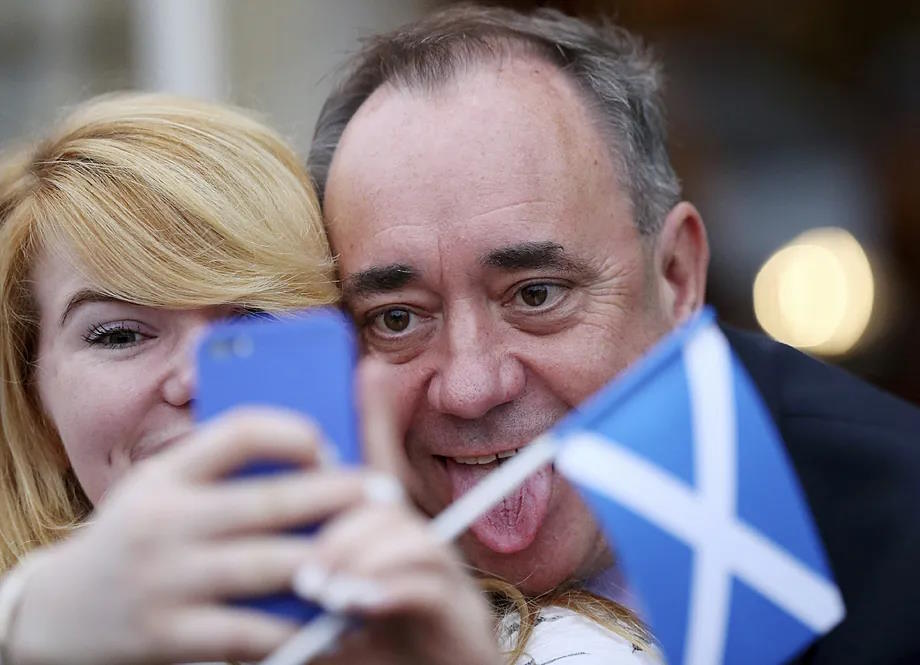Everything was set at the Aberdeen Exhibition Center for the triumphant speech of Alex Salmond after the independence referendum. In a display of premature indulgence, the "Yes" campaign had even leaked the content of his speech to some media, such was the conviction of a miraculous victory against all odds over the "No" in the final stretch.
At 10:30 p.m. on September 18, 2014, YouGov accurately predicted the storm that was coming. A 10-point victory for the vote against independence (55% to 45%). Salmond obviously canceled his plans, took a plane to Edinburgh, and chose to remain silent. Hours later, he announced his own resignation and handed over the baton to his right-hand woman, Nicola Sturgeon, in front of cameras and reporters.
David Cameron breathed a relative sigh of relief after beating Salmond in the "Russian roulette," although two years later he shot himself in the foot with the EU referendum. The Scottish question was supposedly settled "for a generation," but what followed was the most turbulent period in recent UK history (five prime ministers in six years).
The ball kept coming back to Scotland, but Sturgeon hit a wall in her attempt to call for a second independence referendum. The Scottish 'iron lady' was embroiled in a scandal of illegal financing, and the SNP went into a tailspin. Her successor and ally Humza Yousaf resigned after a year. The historic John Swinney took the reins, and the Scottish National Party lost 39 seats in the July 2024 elections, surpassed by Keir Starmer's Labour Party.
A decade has passed, and here we are. A recent YouGov poll gives a 56% lead to the "No" for independence, compared to 44% supporting the Yes. Another survey, this one by Opinium for The Times, however, warns that support for independence is majority among young people under 34.
"The issue is far from resolved: among the youth, there is a strong sentiment in favor of independence," warns Kirsten Thornton, co-founder of Generation Yes a decade ago. "The problem is everything that has happened in these years both in London and Edinburgh, and the growing perception that politicians only look out for themselves and ignore people's issues."
"I voted 'No' 10 years ago, but seeing how things have gone after Brexit, I am willing to vote 'Yes' if there were a second referendum," warns Jim McGregor, who runs a whisky shop in Inverness, the gateway to the Highlands. "There are only problems for exporting and more bureaucracy since we left the EU. We are paying a high price for it, and that has created a lot of resentment among the Scots."
It is estimated that Brexit has cost the whisky sector around six million euros per week. Salmon exports to the EU, Scotland's other major "natural resource," dropped from 53,000 to 44,000 tons between 2019 and 2023. "Exporting to France is not the same as exporting to New Zealand," McGregor emphasizes. "And I have the feeling that the 'Scotland brand' would be more valued if we go it alone, like small countries such as Denmark or Iceland do."
In Glasgow, the capital of the "Yes" movement, Alex Salmond has seized the anniversary to reclaim lost prominence, now leading the Alba Party, which barely managed 11,700 votes in the recent elections and has only one regional representative. "We have to put an end to a series of humiliations, capitulations, and surrenders in this country," Salmond proclaimed to a handful of independence supporters in George Square. "The 10 years we have had for a new referendum have been of no use. In Scotland, we now have a 'zombie' Parliament."
Salmond has taken the opportunity to wield the war axe and blame former "protégée" Nicola Sturgeon for "having wasted a decade" for the independence cause. The two architects of the 2014 referendum have been at odds for years following the scandal over alleged abuses by Salmond, also clashing over the failed strategy for calling a second referendum.
"We crashed against the Westminster wall," Sturgeon admitted, marking the moment in her own way. "But I believe that a shake-up in the UK government will make the reunification of Ireland feasible, grant more autonomy to Wales, and eventually lead to independence for Scotland. I will campaign for that until my last breath."
"We have had a long and dark decade marked by austerity, Brexit, the pandemic, and the cost of living crisis," concluded Scotland's First Minister, John Swinney, also subtly aligning himself, without fanfare, with the independence cause in the medium to long term: "I am confident that this anniversary will be a new awakening for the 'Yes' movement."
